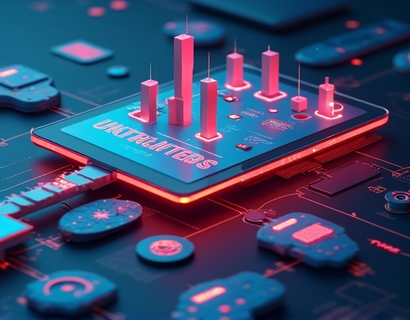AI-Powered Integration Agent: Revolutionizing Business Efficiency Through Seamless Automation and Enhanced Collaboration
In today's fast-paced business environment, organizations are constantly seeking ways to enhance efficiency, streamline operations, and gain a competitive edge. One of the most transformative solutions emerging is the AI-powered integration agent, a sophisticated technology designed to seamlessly integrate into various business processes. This advanced tool not only automates repetitive and time-consuming tasks but also provides actionable insights and fosters enhanced collaboration among team members. By leveraging the power of artificial intelligence, businesses can revolutionize their operations, leading to significant improvements in productivity and decision-making.
Understanding AI-Powered Integration Agents
An AI-powered integration agent is a software solution that utilizes artificial intelligence and machine learning algorithms to connect and integrate different systems, applications, and data sources within an organization. These agents act as a bridge, ensuring smooth communication and data flow between disparate systems, thereby eliminating silos and fostering a more cohesive work environment. The primary goal of these agents is to automate routine tasks, reduce manual errors, and provide real-time insights that can drive informed decision-making.
Key Benefits of AI-Powered Integration Agents
The implementation of AI-powered integration agents offers numerous benefits that can significantly enhance business operations. First and foremost, these agents automate repetitive and mundane tasks, freeing up valuable time for employees to focus on more strategic and creative work. This automation leads to increased productivity and efficiency, as tasks are completed faster and with fewer errors. Additionally, the real-time data insights provided by these agents enable businesses to make data-driven decisions, improving overall strategic planning and execution.
Another critical benefit is the enhancement of collaboration among team members. By integrating various communication and project management tools, AI-powered agents ensure that all team members have access to the most up-to-date information and can work together seamlessly. This improved collaboration not only speeds up project completion but also fosters a more innovative and dynamic work culture.
Automation of Routine Tasks
One of the most immediate and tangible benefits of AI-powered integration agents is the automation of routine tasks. These tasks, often referred to as repetitive or administrative work, can include data entry, report generation, scheduling, and more. By automating these processes, businesses can significantly reduce the time and resources required to complete them. This not only saves costs but also minimizes the risk of human error, ensuring higher accuracy and reliability in task execution.
For instance, in a customer service context, an AI-powered agent can automate the process of logging customer inquiries, categorizing them, and routing them to the appropriate support team. This not only speeds up the response time but also ensures that customer issues are handled more efficiently and consistently. Similarly, in finance, these agents can automate the reconciliation of accounts, generation of financial reports, and even detect anomalies that may indicate fraudulent activity.
Providing Actionable Insights
Beyond automation, AI-powered integration agents excel in providing actionable insights that can drive business growth and optimization. By analyzing vast amounts of data from various sources, these agents can identify patterns, trends, and correlations that might not be immediately apparent to human analysts. These insights can be used to optimize business processes, improve customer experiences, and identify new revenue opportunities.
For example, in the retail sector, an AI-powered agent can analyze sales data, customer behavior, and market trends to provide insights on inventory management, pricing strategies, and marketing campaigns. These insights can help retailers make more informed decisions, such as adjusting inventory levels to match demand, optimizing prices to maximize profits, and tailoring marketing efforts to target the most promising customer segments.
Enhancing Collaboration and Communication
Effective collaboration and communication are crucial for the success of any organization. AI-powered integration agents play a pivotal role in enhancing these aspects by integrating various communication and collaboration tools. These agents can connect different platforms, such as email, chat, project management software, and document sharing services, ensuring that all team members have access to the necessary tools and information.
For instance, an AI-powered agent can integrate Slack for real-time messaging, Trello for project management, and Google Drive for document sharing. This integration ensures that team members can communicate and collaborate seamlessly, regardless of the tools they are using. Additionally, these agents can provide features like automated meeting scheduling, task assignment, and progress tracking, further streamlining the collaboration process.
Case Studies and Real-World Applications
To better understand the impact of AI-powered integration agents, let's explore a few real-world applications across different industries.
In the healthcare sector, an AI-powered agent can integrate electronic health records (EHRs), laboratory results, and patient management systems. This integration allows healthcare providers to access comprehensive patient information in real-time, leading to more accurate diagnoses and personalized treatment plans. The agent can also automate routine tasks such as appointment scheduling and medication reminders, improving patient care and operational efficiency.
In the manufacturing industry, AI-powered agents can integrate production lines, supply chain management systems, and quality control tools. This integration enables real-time monitoring of production processes, predictive maintenance of equipment, and immediate detection of quality issues. As a result, manufacturers can reduce downtime, lower costs, and ensure consistent product quality.
In the marketing domain, an AI-powered agent can integrate social media platforms, customer relationship management (CRM) systems, and analytics tools. This integration allows marketers to monitor customer interactions, track campaign performance, and gain insights into customer preferences. Armed with these insights, marketers can create more targeted and effective campaigns, leading to higher engagement and conversion rates.
Implementing AI-Powered Integration Agents
Implementing an AI-powered integration agent involves several key steps to ensure a smooth and successful integration into existing business processes.
First, it is essential to conduct a thorough assessment of the current IT infrastructure and identify the specific areas where integration is needed. This assessment should involve stakeholders from various departments to ensure a comprehensive understanding of the business requirements.
Next, select an AI-powered integration solution that aligns with the organization's goals and technical capabilities. Consider factors such as scalability, ease of use, and compatibility with existing systems. It is also crucial to choose a provider with a strong track record of reliability and customer support.
Once the solution is selected, the implementation process typically involves setting up the integration agent, configuring the connections between different systems, and testing the integration to ensure everything works as expected. Training for end-users is also essential to ensure they can effectively utilize the new tools and features.
After the initial setup, ongoing monitoring and optimization are necessary to maintain the benefits of the integration. This includes regular updates to the AI algorithms, addressing any issues that arise, and continuously gathering feedback from users to improve the system further.
Challenges and Considerations
While the benefits of AI-powered integration agents are clear, there are also challenges and considerations that organizations should be aware of. One of the primary concerns is data security and privacy. Integrating multiple systems can increase the risk of data breaches, so it is crucial to implement robust security measures and comply with relevant regulations.
Another challenge is the potential resistance to change from employees. Introducing new technology can be met with skepticism or reluctance, especially if users are not adequately trained or if the benefits are not clearly communicated. To overcome this, organizations should involve employees in the implementation process, provide comprehensive training, and highlight the positive impact on their work.
Additionally, the success of AI-powered integration agents depends on the quality and accuracy of the data they process. Poor data quality can lead to incorrect insights and decisions, so it is essential to invest in data governance and management practices to ensure data integrity.
Future Trends and Innovations
The field of AI-powered integration is rapidly evolving, with ongoing advancements in AI technology and increasing adoption across industries. One of the emerging trends is the integration of natural language processing (NLP) capabilities, allowing agents to understand and respond to human language more effectively. This can further enhance collaboration and make interactions with the agent more intuitive and user-friendly.
Another area of innovation is the use of edge computing, which involves processing data closer to the source rather than in centralized data centers. This can reduce latency and improve the real-time capabilities of integration agents, making them even more effective in scenarios requiring immediate responses.
Furthermore, the integration of AI with other emerging technologies, such as the Internet of Things (IoT) and blockchain, is opening up new possibilities for business optimization. For example, IoT devices can provide real-time data on equipment performance, which can be integrated and analyzed by AI agents to predict maintenance needs and prevent downtime.
Conclusion
AI-powered integration agents represent a significant leap forward in business efficiency and collaboration. By automating routine tasks, providing actionable insights, and enhancing communication, these agents can transform the way organizations operate. As businesses continue to face increasing competition and complexity, embracing this technology is not just an option but a necessity for those looking to stay ahead and thrive in the digital age.










































